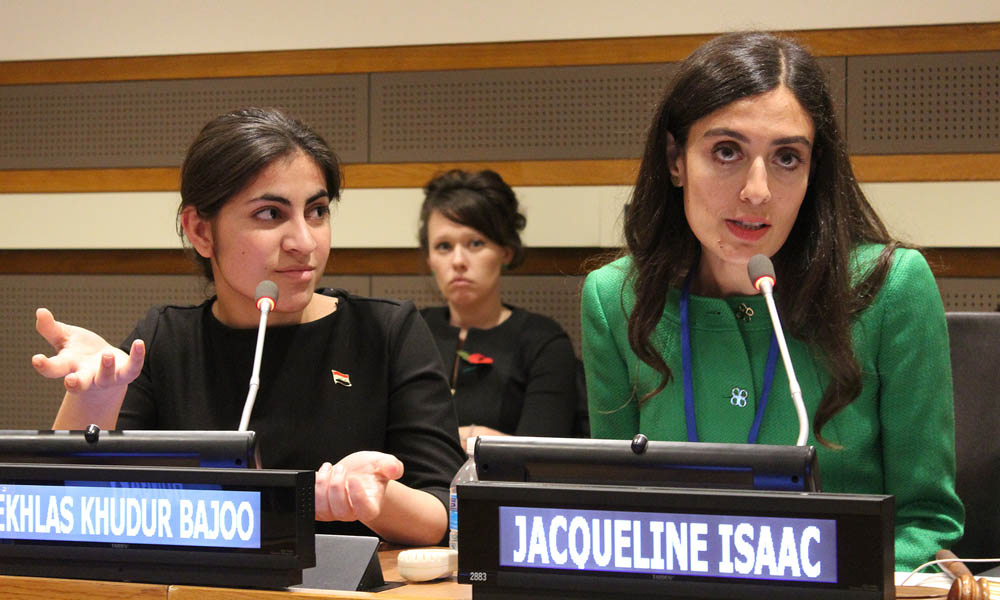
Ekhlas Khudur Bajoo of Iraq gestures as she listens to Jacqueline Isaac during a Nov. 2 forum at U.N. headquarters in New York. Bajoo, 17, experienced six months of daily rape and humiliation by Islamic State militants who kidnapped her when she was 14. She said she sees herself as a symbol of hope for religious and ethnic minorities victimized by IS. (CNS/Courtesy United Nations)
"This story is going to be hard," I tell my sophomore Scripture class as we start Genesis 34.
Dinah is raped by Shechem, son of Hamor the Hivite. After the rape, Shechem tells Hamor to "get me this girl for a wife." So, Hamor meets with Dinah's father, Jacob, and the two tribal chieftains quickly realize that an opportunity is at hand for a mutually beneficial political alliance. A bargain is struck. Dinah is to marry Shechem.
Jacob's sons — "speaking with guile because their sister had been defiled" — agree to the arrangement under the condition that all the males in Hamor's tribe get circumcised. Hamor complies and, after their circumcisions, he and all of his men go to their tents to recover. It's at this moment of vulnerability that Jacob's sons swoop in, kill them all, and loot the town. Jacob angrily confronts his sons, to which they reply, "Should our sister have been treated like a harlot?"
The morality of these men's actions (especially the killing in tents) has been debated for centuries. What hasn't been debated much is the question I pose to my sophomores: "Whose voice is missing in all this?" That's right. Dinah, the afterthought.
We look at this story and think, "How horrible were those people in those days!" But, then we read about types like Harvey Weinstein and Roy Moore — and by now so many other men in entertainment, business, media and politics — and how deviously they insulate themselves from consequences, and we begin to wonder how enlightened we really are these 4,000 years later. Those stories about sexual assault/abuse of power from back then are still being written today.
And that broader question from back then also needs to be asked today: Whose voice is missing? That's a big question for many industries and communities right now. Even among groups and associations that one might think would be modern and up-to-date on trends and issues, the question needs to be asked. Take, for example, tech companies. Turns out that some of those cutting-edge companies are infected with guys-only cultures that gag female voices. They're tribalistic in their own ways, fueled by sympathetic internet communities such as the Red Pill (founded on the belief that society is anti-male and that men have been socially disenfranchised), and misogynistic online clubs like MGTOW, "Men Going Their Own Way."
Now, since I work in the Catholic Church, one could rightfully ask how anyone living behind stained glass windows could be throwing stones. It's true that there is something absurd about, for example, bishops meeting without women to decide the role of women in the church. Similarly, it doesn't make much sense for an all-male congressional committee to craft health care legislation, nor should we have a presidential Cabinet today that looks a lot like George Washington's Cabinet.
These modern examples aren't very different from the tribal cultures that silenced Dinah. It continues to this day because the behavior is self-perpetuating. I read a quote by Sallie Krawcheck, a former chief executive officer of the financial firm Smith Barney, that captures the phenomenon: "When you have a boardroom full of mature, Caucasian gentlemen, their network will consist of people like them, and they'll tend to invite people like them onto the board." The phenomenon Krawcheck describes is known as a "male monoculture."
Why does any of this happen? Partly it's comfort. I think an unhealthy pattern any of us can fall into (women and men) is seeking out our own image, listening to voices that sound the same as our own. (Certainly, that happens with viewership of cable news shows.) This pattern is unhealthy because it narrows our vision and stunts growth. It becomes downright destructive, however, when it's linked to the tie that binds male monocultures: power. That's why silenced Dinahs and Jacob-Hamor type pacts aren't limited to the Old Testament. They persist wherever power is retained through exclusion.
Advertisement
The devastation this exclusion has wreaked upon women is finally receiving the attention it warrants. Hopefully, we will also become more mindful of how much it damages important institutions that we all depend upon. Tech team sessions, bishops' conferences, legislative committees, and Cabinet meetings need strong, clear female voices if they are to be effective. And those voices are also necessary so that men like me don't fill in what's missing on our own.
I grew up with three sisters (no brothers). My life includes a mom, a wife and a daughter. I count many women among my friends, mentors and colleagues. Occasionally, the virtue of simply having these relationships gives me the false confidence that I understand the "woman's perspective." But knowing women does not mean that I know women, nor does it mean that I can understand a perspective that is derived from an experience I've never had. The fact is that I can only hear this perspective if there are female voices giving it, and if I am listening.
Whose voice is missing? I'm happy to report that my sophomores — female and male — knew the answer right away. And it took no coaching from me for them to understand why Dinah's voice needed to be heard.
This commentary previously appeared as a blog post on Seattle Prep's website, seaprep.org.
[Kent P. Hickey is president of Seattle Prep, a Jesuit sponsored high school in Seattle, Washington, and is the author of Finding Your Posts, available on Amazon.]







